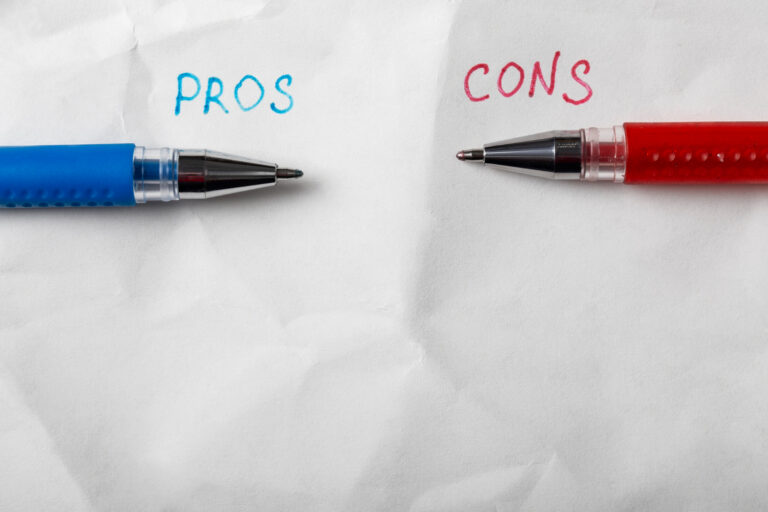It’s important to carefully analyze all relevant factors and weigh the advantages and cons before making judgments. Understanding the benefits and drawbacks is crucial when picking anything, be it a job route, a new device, or even a holiday spot. We’ll go over the advantages, disadvantages, and vital factors to think about before making crucial decisions.
Pros
- Informed Decision-Making: Considering the pros enables you to make well-informed decisions based on the advantages a particular option offers. By understanding the potential benefits, you can align your choices with your goals and aspirations.
- Clarity: Examining the pros provides clarity about the positive outcomes associated with a decision. This can boost your confidence, enhance your motivation, and help you move forward with a sense of purpose.
- Maximizing Opportunities: Identifying the pros allows you to maximize potential opportunities. By recognizing the advantages of a certain choice, you can leverage them to achieve desired outcomes and make the most of the situation.
- Minimizing Regrets: By carefully weighing the pros, you can reduce the likelihood of future regrets. Understanding the benefits of a decision helps you avoid potential pitfalls and make choices that align with your values and priorities.
- Enhanced Problem-Solving: Evaluating the pros encourages critical thinking and problem-solving skills. By analyzing the advantages of different options, you can develop creative solutions and find innovative approaches to challenges.
- Confidence Building: Understanding the benefits of a decision can boost your confidence. Knowing the positive outcomes that may arise from your choice can give you a sense of assurance and self-assurance.
- Increased Efficiency: Considering the pros allows you to streamline your decision-making process. By focusing on the advantages, you can eliminate options that don’t align with your objectives, saving time and energy.
Cons
- Neglected Drawbacks: Failing to consider the cons can lead to unforeseen challenges and disadvantages. Ignoring potential drawbacks may result in unexpected complications or unfavorable outcomes that could have been avoided.
- Unfulfilled Expectations: If you overlook the cons, you might set unrealistic expectations. Unrealized drawbacks can lead to disappointment, frustration, and a sense of regret if the outcome does not meet your initial hopes.
- Limited Perspective: Not considering the cons narrows your perspective and limits your ability to assess the situation objectively. It’s important to acknowledge the downsides to make well-rounded decisions that take into account the full picture.
- Analysis Paralysis: Delving too deeply into the cons can lead to overthinking and analysis paralysis. Excessive focus on the drawbacks may hinder decision-making, causing unnecessary delays and missed opportunities.
- Bias and Subjectivity: Evaluating the cons requires self-awareness to avoid biases and subjective judgment. It’s important to objectively assess the potential drawbacks and not let personal preferences or preconceived notions cloud your judgment.
- Fear of Failure: Overemphasizing the cons may trigger a fear of failure, preventing you from taking calculated risks and exploring new possibilities. It’s essential to strike a balance between considering the drawbacks and maintaining a growth mindset.
Things to Consider
- Personal Values and Priorities: Reflect on your core values and priorities when evaluating the pros and cons. Consider how each option aligns with what matters most to you, ensuring your choices are in line with your principles.
- Long-Term Implications: Think beyond the immediate benefits or drawbacks and consider the long-term consequences of your decision. Evaluate how the pros and cons may impact your future goals and aspirations.
- Risk Tolerance: Assess your tolerance for risk and uncertainty. Some decisions involve more uncertainty or potential downsides than others. Understanding your risk tolerance will help you make choices that you’re comfortable with.
- Trade-Offs: Recognize that most decisions involve trade-offs. Consider the compromises you’re willing to make and evaluate the significance of the pros and cons relative to your desired outcome.
- Seeking Advice and Input: When faced with complex decisions, seeking advice from trusted individuals can provide valuable insights and perspectives. Consult with mentors, friends, or professionals who can offer guidance and help you consider factors you might have overlooked.
- Impact on Others: Consider how your decision may affect others, such as family, friends, or colleagues. Assessing the potential impact on those around you can contribute to more considerate and responsible decision-making.
- Flexibility and Adaptability: Keep in mind that circumstances can change, and unforeseen challenges may arise. Assess the flexibility and adaptability of your options to determine how well they can accommodate unexpected situations.
- Gut Feeling: While weighing the pros and cons is important, trusting your intuition or gut feeling can also play a role. Sometimes, instinctive reactions can provide valuable insights that go beyond logical reasoning.
Making informed decisions involves a comprehensive evaluation of the pros and cons while considering key factors. By examining the advantages, disadvantages, and various aspects of a decision, you can navigate choices with greater clarity and confidence. Remember to consider personal values, long-term implications, risk tolerance, and trade-offs to align your decisions with your goals and priorities. Striking a balance between the pros and cons empowers you to make well-rounded choices that lead to favorable outcomes and personal growth.




